International Symposium of Life-Cycle Emissions of Future Vehicles and Mobility Ended with Success
The two-day " International Symposium of Life-Cycle Emissions of Future Vehicles and Mobility (LIEF) (LIEF) " (November 29-30, 2021, online video conference) has come to a successful conclusion. The conference was organised jointly by Tsinghua University, Peking University, and the University of Birmingham, and was online live streaming through the partner media, ZXZC. This conference has focused on life cycle CO2 emissions in transportation and impact on the environment, regarding the opportunities and challenges of the automotive industry under the background of “carbon peaks and carbon neutrality”. In the panel discussions, guests and nearly a hundred audience members conducted in-depth exchanges and extensive discussions on hot topics such as new energy vehicles, hydrogen energy and fuel cells, and low-carbon development pathways for the entire life cycle of vehicles. At the time of press releasing, the event had 50,000 cumulative attendances on the ZXZC live webcast platform.
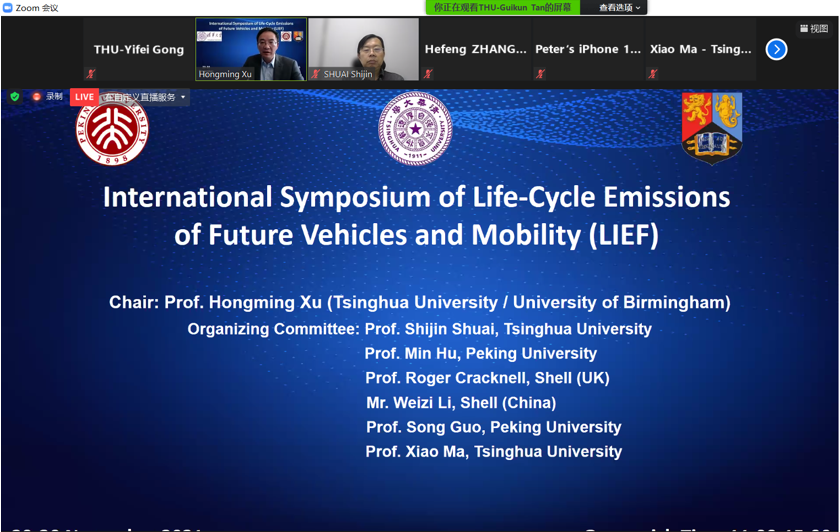
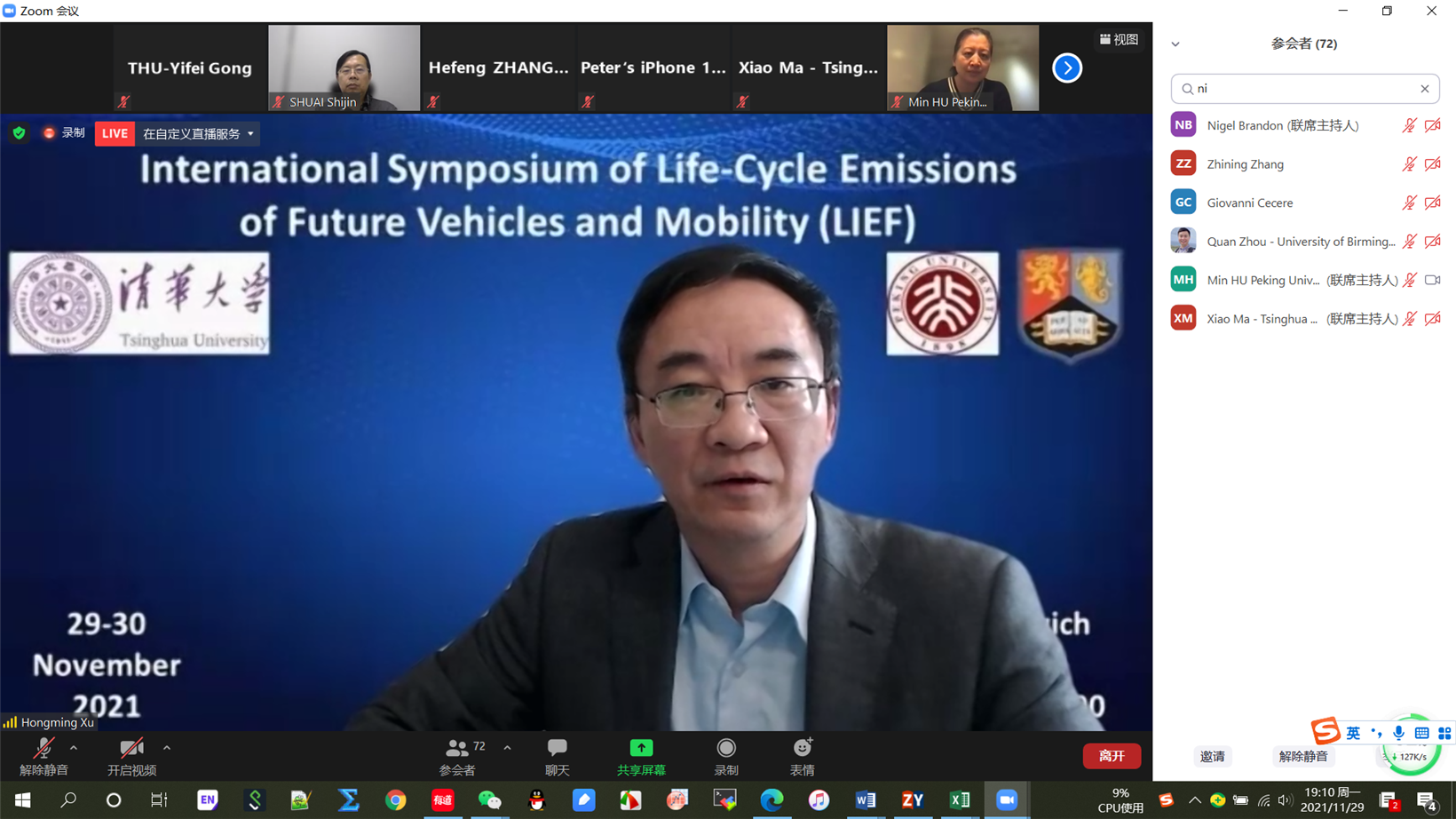
Professor Hongming Xu from Tsinghua University/University of Birmingham, chair of the organizing committee, elaborated on the theme and significance of the symposium in his opening address. The main source of emissions in the transportation field has notably been from the vehicle power system, which has received extensive attention and research. Currently, vehicles powered by internal combustion engines are in the transition to electrified power systems. In the context of "emission peak and carbon neutrality", the carbon emissions of the full life cycle of vehicles have become due research topics. This international conference is to bring a "brainstorming" from the world's leading research groups to discuss the challenges and opportunities faced by related fields under the goal of "carbon neutrality". It focus on the prospects of the future automobile and explores the corresponding technological pathways, which is very important for achieving the goal of carbon neutrality throughout the life cycle of vehicles and mobility.
The conference was scheduled for Monday and Tuesday, from 7pm to 11pm Beijing time, making it easier for all regions of the world to participate online. On the first day, world leading experts and scholars from Asia (Tsinghua University, Peking University, Chinese Academy of Environmental Sciences, China Automotive Technology Research Institute, Maruti Suzuki India), Europe (Ex Shell and Aramco, Imperial College, University of Birmingham, Shell, Ford / FVV, Cambridge University) and North America (Carnegie Mellon University, Afton, Aramco) were invited to show their latest research outcomes at the state of the art and provide discussions and interactions.
Chief Engineer Hefeng Zhang from the Chinese Academy of Environmental Sciences made the first presentation entitled "Life-cycle Reduction Goal and Path of Vehicles Based on Carbon Peak and Neutraility targets". He said that China currently has the highest carbon emissions in the world, and the proportion of carbon emissions in the transportation sector should not be ignored (9%). The United States and the European Union have established the management system of CO2 emission standard, but China has currently only controlled CO2 emissions from fuel consumption, and has not formulated a CO2 emission standard for motor vehicles. The carbon emissions of traditional fuel vehicles when in use account for the highest proportion of carbon emissions in the full life cycle of vehicles, reaching 80%. Therefore, reducing fuel consumptions and reducing using frequencies and mileages are effective means to reduce the carbon emissions of traditional fuel vehicles. For new energy vehicles, it is essential to focus on carbon emissions in the energy production stage. From the perspective of life cycle, pure electric vehicles could produce less carbon emissions, compared with traditional fuel vehicles. He also expressed his views on how to achieve the goal of "emission peak and carbon neutrality" in the transportation field from four aspects: clean cars, transportation rails, new energy vehicles, and low-carbon energy.
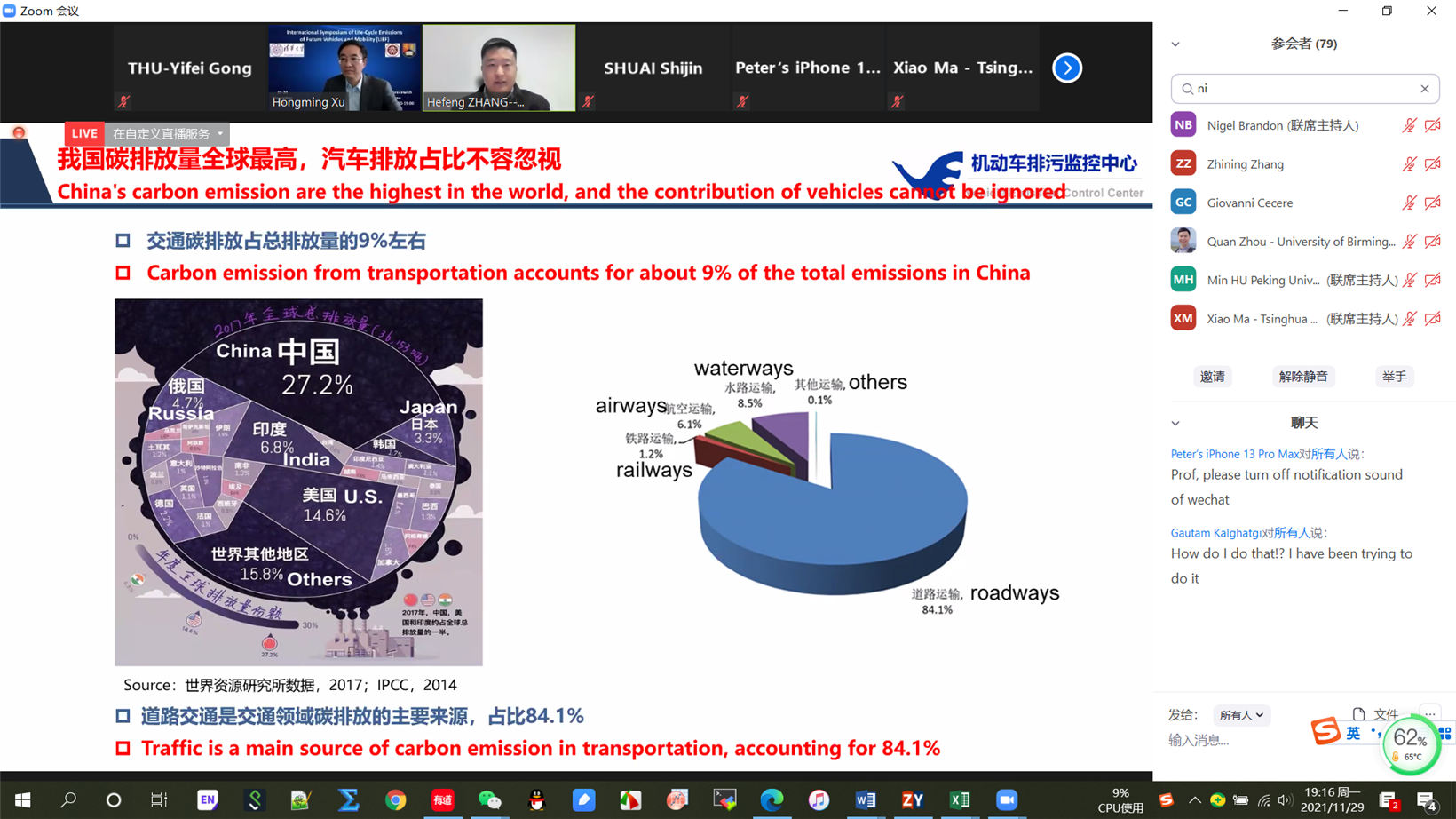
On the first day of the conference, Professor Gautam Kalghatgi, Fellow of the Royal Academy of Engineering, made a presentation entitled "What Role for Internal Combustion Engines in the Future". He discussed the future opportunities and challenges of internal combustion engines. Professor Nigel Brandon FRS from Imperial College London gave a speech entitled "Progress in Hydrogen Fuel Cell Electric Vehicles". He described the role of hydrogen energy in the industrial economy and discussed the cost of green hydrogen energy in its production. Professor Roy Harrison FRS from the University of Birmingham revealed and discussed the non-exhaust emissions of road traffic. In his report, he discussed in detail the proportion of different pollution sources in the total PM10 and PM2.5 emissions in a year.
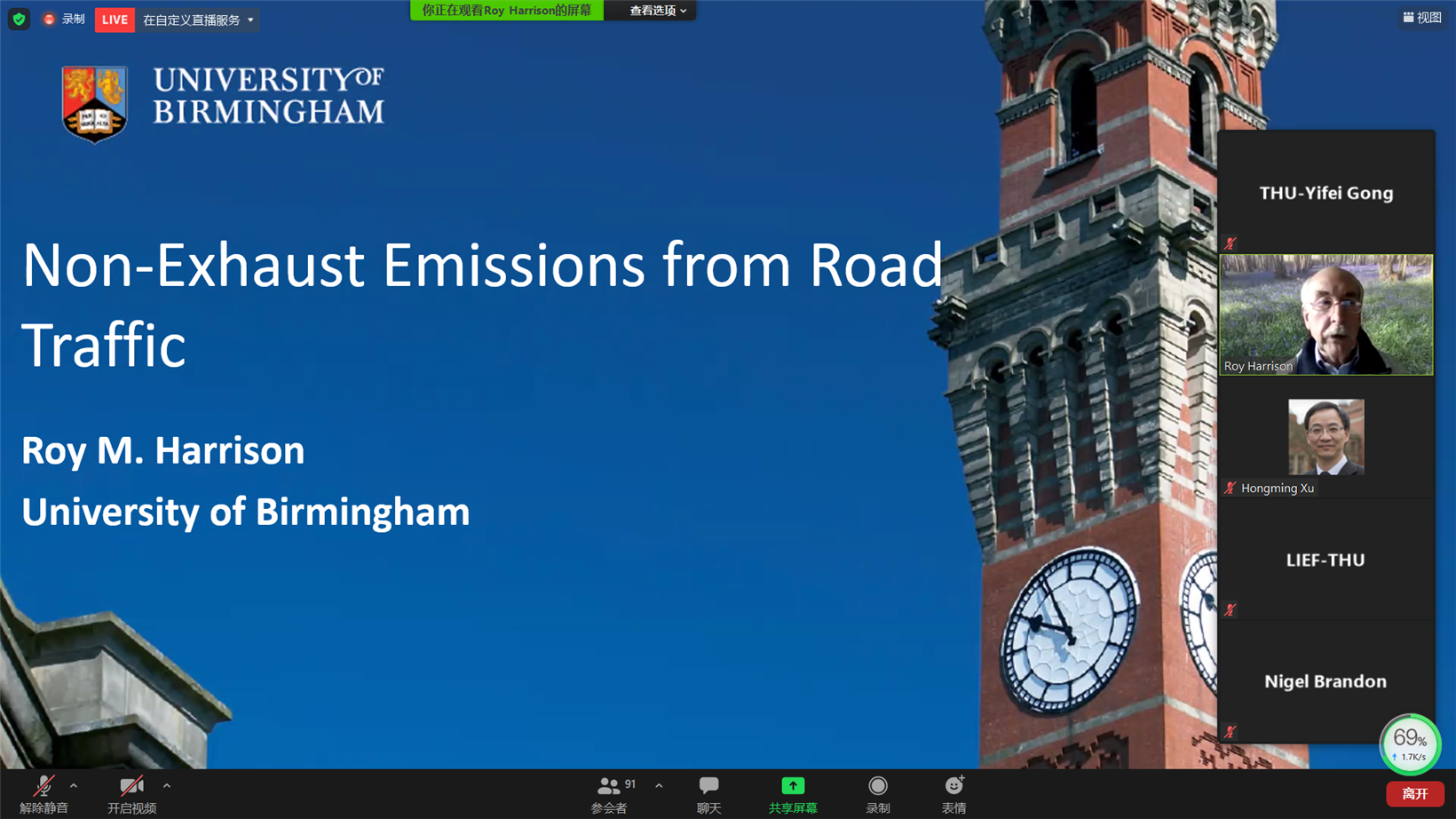
Professor Allen Robinson from Carnegie Mellon University presented a study entitled "Linking Tailpipe to Ambient: Quantifying Contribution of Vehicles to Ambient PM2.5". He showed that one hour after the generation of emissions, the amount of secondary particulate matter could exceed the original total emissions of PM2.5. Mr Matthias Mundt from Shell discussed the world's future energy needs and introduced Shell's development vision in 2050.
Following the panel discussion, Professor Shijin Shuai / Professor Hongming Xu from Tsinghua University made a special presentation entitled "Sources of Life Cycle Emissions of Vehicles", which reviewed in detail the various sources of pollutant emissions during the full life cycle of automobiles and also study of the evolution of particulates in the exhaust system of GDI engine powered vehicles. Professor Min Hu / Song Guo from Peking University delivered their special presentation titled "SOA Formation from Chinese Vehicle Emissions", which showed in detail the research results of the their team on aerosol emissions in the transportation field. Participants had an in-depth discussion on the topic of "carbon peak and carbon neutrality" and the full life cycle emissions of future automobiles. They answered the questions from the audience, and which brought a very exciting academic event the end for the first day.
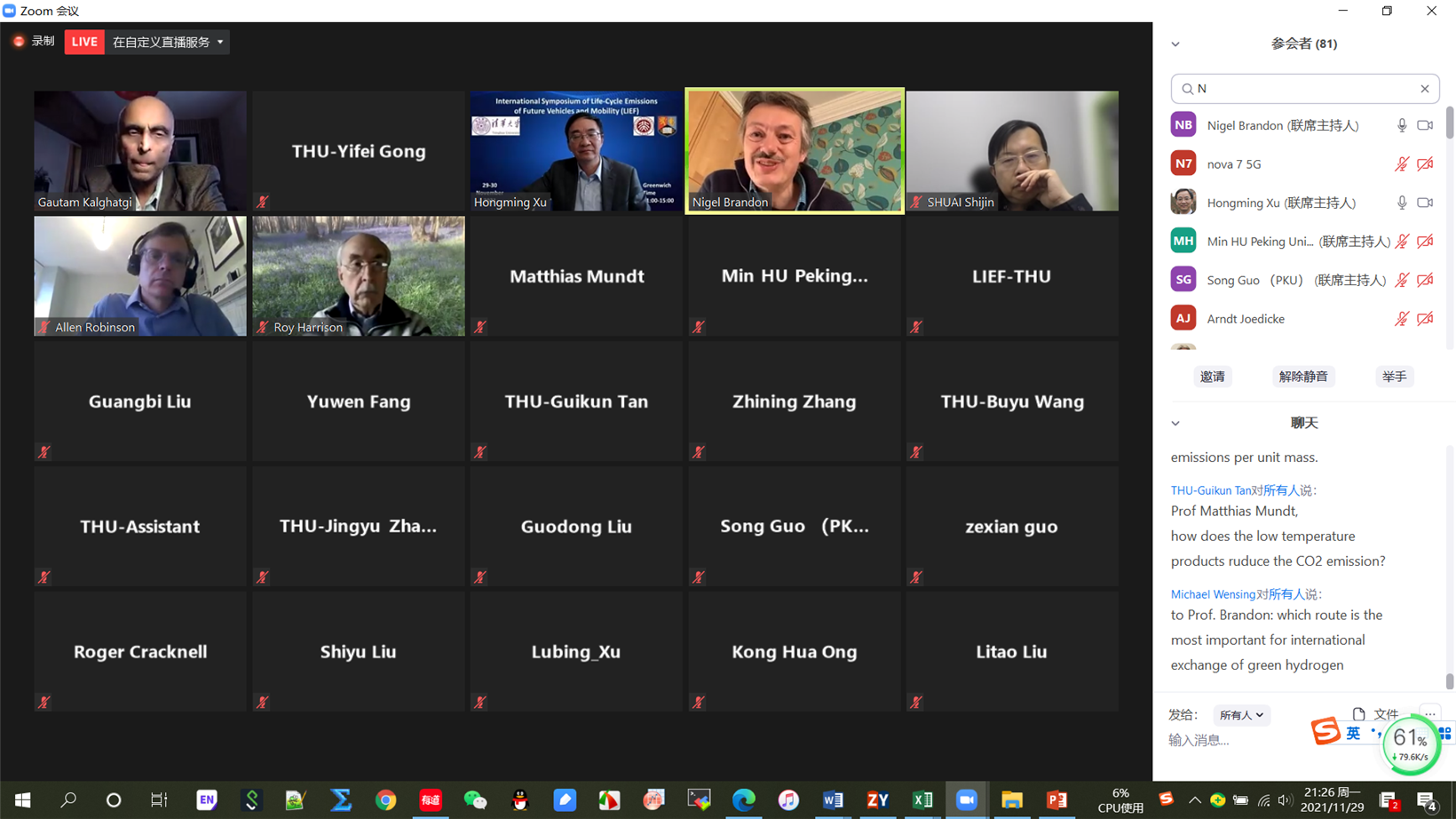
On the second day of the conference, experts and scholars from Europe, Asia, and North America made very interesting reports and presentations. Dr. Ulrich Kramer from Ford FVV in Germany made a very comprehensive report entitled "Transformation of Mobility to the GHG Neutral Post Fossil Age – Most Efficient Paths to Carbon Neutral Mobility in 2050 FVV Fuels Study IV". He discussed in detail about the current pollutant emissions of various European vehicles. Dr. Ingo Mikulic from Shell, Germany, reported "Regulatory Framework for on Road Mobility Transition in EU". He described in detail the current fuel standards in the European Union and Shell’s efforts to cope with the current trend of electrification of vehicles. This was added by the contribution from Professor Roger Cracknell of Shell in the following panel discussion later. Professor Huan Liu from Tsinghua University made a report titled "Primary Organic Gas Emissions from Gasoline Vehicles in China: Factors, Composition and Trends". She emphasized that targeted emission reduction measures and more accurate analysis and testing were necessary to adapt to changes in organic gas emissions of gasoline vehicles. Professor Markus Kraft from the University of Cambridge delivered a talk entitled "A Thermodynamic Digital Twin Approach for Future Fuels, Combustion Modes and Emissions", and he discussed the simulation method of particulate matter in automobile exhaust under road conditions. Dr. Huifang Shao from Afton, USA, reported a study entitled "Fuel and Lubricant Additives: Roles in Emissions Control". She emphasized the important role of additives in emission reduction control. Dr. Sun Zinc from China Automotive Technology Research Institute presented "Research on Automotive Low-Carbon Development Pathways to Life Cycle Net Zero Carbon Emissions", in which she proposed the development path of net zero carbon emissions in the entire life cycle of automobiles. Dr. He Xin from Aramco, US, presented "A Holistic Approach to Reduce Transport GHGs", in which he introduced his research on carbon neutral fuels. Dr. Anoop Bhat from Maruti Suzuki India, made a report entitled "Global Warming Concern & Localised Solutions for Sustainable Development-Indian Perspective", in which he introduced India's efforts in coping with global warming and sustainable development.
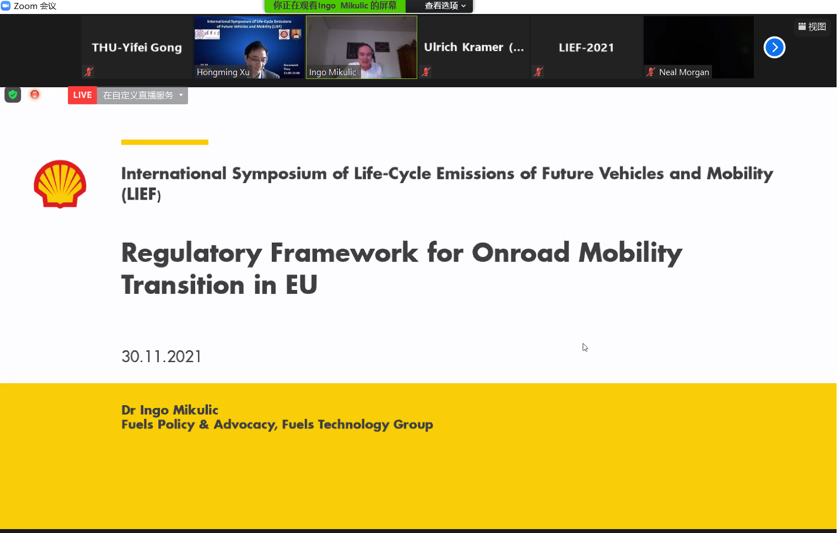
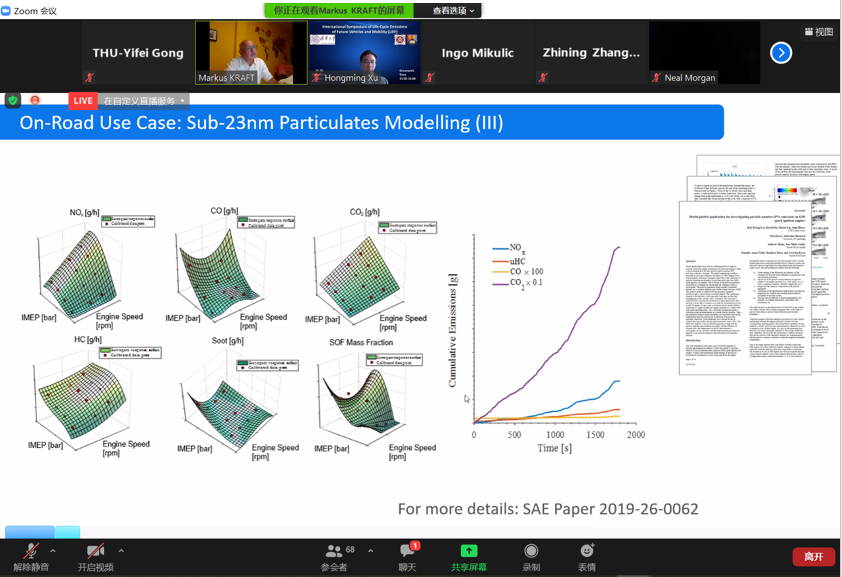
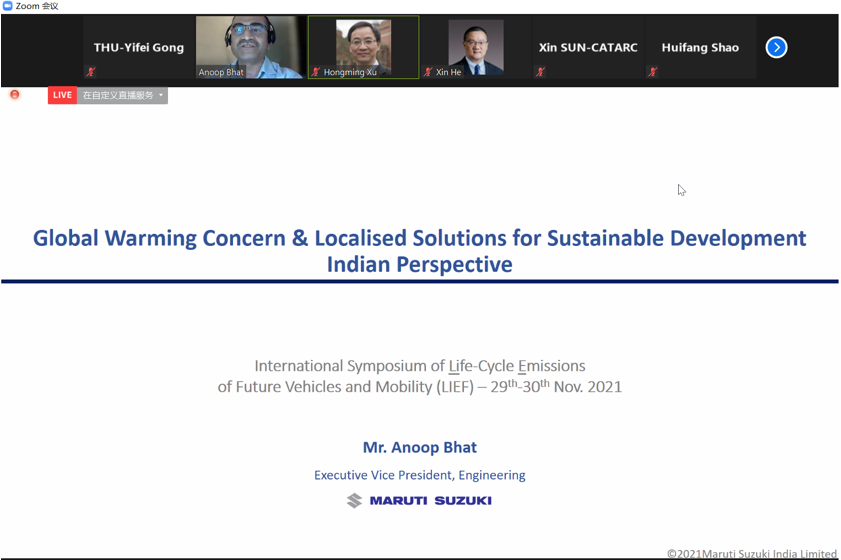
In the panel discussion, all the speakers had in-depth discussions on topics such as clean energy, carbon emissions from vehicle power systems, and simulation of combustion pollutants generation, and actively interacted with the audience. Finally, Professor Hongming Xu, chairman of the organizing committee, summarized and affirmed the good results of the symposium with many thanks to all the contributors who made the event possible.
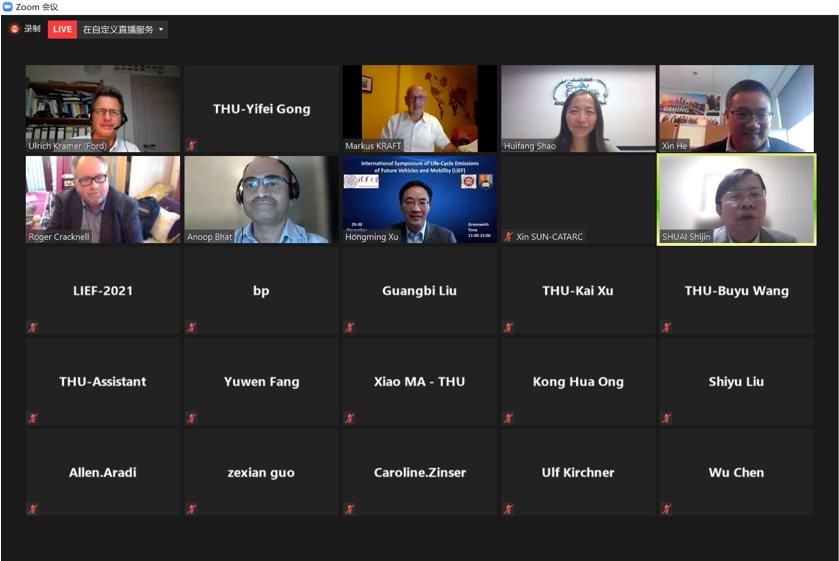
This event has had a very active atmosphere and a wide range of influences. As of press time, the number of online replays on the ZXZC live streaming platform is still increasing. The intensive and extensive discussions on the carbon reduction actions and the transformation and upgrading of the automotive industry, under the objective of reaching “Carbon Peak and Carbon Neutrality”, have brought a very interesting information dissemination and exchange event to the audiences around the world.

